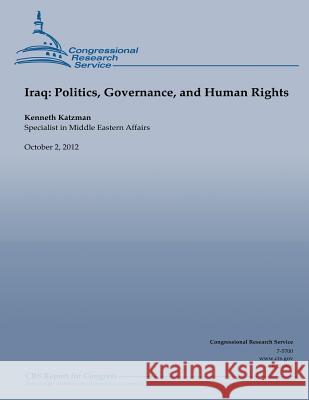Iraq: Politics, Governance, and Human Rights » książka
Iraq: Politics, Governance, and Human Rights
ISBN-13: 9781490479224 / Angielski / Miękka / 2013 / 56 str.
Iraq: Politics, Governance, and Human Rights
ISBN-13: 9781490479224 / Angielski / Miękka / 2013 / 56 str.
(netto: 56,98 VAT: 5%)
Najniższa cena z 30 dni: 59,00
ok. 16-18 dni roboczych.
Darmowa dostawa!
Relations among major political factions broke down in late 2011-a development that, when coupled with spillover from increasingly sectarian conflict in Syria, threatens Iraq's stability, its ability to balance its relations with both Tehran and Washington and the achievements of the long U.S. intervention in Iraq. Sunni Arabs, always fearful that Prime Minister Nuri al-Maliki would seek unchallenged power for Shiite factions, accuse him of sidelining high ranking Sunni Arabs from government. Iraq's Kurds have also become increasingly distrustful of Maliki over territorial, political, and economic issues, and are threatening to limit or end their involvement in the central government. The Shiite faction of Moqtada Al Sadr supported the other groups' efforts in mid-2012 to try to oust Maliki, but Iran-a key Maliki ally and supporter-pressed Sadr to discontinue that action, contributing to the failure of the ouster drive. The infighting, coupled with the emboldening of Iraqi Sunni insurgents by the Sunni-led uprising in Syria, has produced increasingly ambitious attacks by Iraqi Sunni insurgent groups, particularly Al Qaeda in Iraq. These attacks are testing the ability of Iraqi security forces and undermining Maliki's reputation as an ensurer of security and stability. The violence is intended to reignite all-out sectarian conflict, but the attacks have failed to spark such broad conflict to date. However, the political rift and the violence have not halted governance or prevented oil export-led growth.
Zawartość książki może nie spełniać oczekiwań – reklamacje nie obejmują treści, która mogła nie być redakcyjnie ani merytorycznie opracowana.











